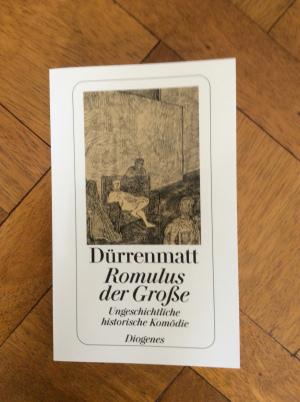What is it about politicians that encourages them to make absurd pitches for power? During the EU Referendum campaign we saw ridiculous promises, based on dodgy assumptions, made with a confidence and certainty that defied reality. In the USA we see it in Donald Trump's campaign slogan: 'Make America great again.'
No definition of 'great'. No real definition of 'America' – by the time you've excluded all the people Donald doesn't like, it isn't clear who is left to enjoy the 'land of the free'.
Anyway, I am only thinking about this because on holiday earlier this month I read five books (including Elvis Costello, Tom Wright and Sam Wells), two of which haunt me: Tom Holland's 'Dynasty: the Rise and Fall of the House of Caesar' and Friedrich Dürrenmatt's 'Romulus der Große'. I have already written very briefly about the first (brilliant book), but it is the latter that comes to mind just now in the context of Trump and other matters.
Not many Brits have heard of Dürrenmatt. A Swiss novelist and playwright, he describes 'Romulus der Große' as an “ungeschichtliche historische Komödie” (an unhistorical historic comedy). Written in 1950, it shows the demise of the Western Roman Empire in the 5th century, with the action taking place during the day of (and the day following) the Ides of March, 476. The Empire is about to collapse under the invasion of the greatly feared Germans and Romulus awaits its – and his – demise calmly. His family, ministers and courtiers try to force him to act decisively against the catastrophic and imminent Germanic invasion, but Romulus prefers to stay at home breeding domesticated chickens and doing nothing in response to the threat.
The ending is surprising and very civilised.
It is very clever, very funny, and needs to be rediscovered nearly seventy years after its initial production. Written in the aftermath of the German catastrophe of the twentieth century, it has much to say to us today in the aftermath of Iraq/Afghanistan, Brexit and America. Here are a few quotes (my translation as I only have the text in German):

Even the worst news sounds quite pleasant when spoken by someone who has rested well, has bathed and shaved, and has had a good meal.
It is not about the content of the language…
ZENO: “Now we must save our culture.” ROMULUS: “In what way is culture something that can be saved?”
Echoing elements of George Orwell's 1984, Romulus and Zeno (Emperor of the Eastern Roman Empire and escaped from Constantinople) come up with slogans they might use to counter the German invaders:
“For freedom and servitude!” “For slavery and justice!” “For caprice against barbarism!”
Rea, the daughter of Romulus, argues with her father that he must give everything to save the fatherland:
REA: “Our unconditional love for the Fatherland is what made Rome great.” ROMULUS: “But our love did not make Rome good.”
Which is where Trump comes in. Has greatness solely to do with power? Or success? Or self-protection? Where does “making America good” come in? Or the UK, for that matter?
I could quote other bits that resonate still, but that will do for now. Read the play – it isn't long. I have no idea if it is available in English, but the German is powerful even today. Under the humor and the satire there is a powerful punch.
 Posted with Blogsy
Posted with Blogsy
